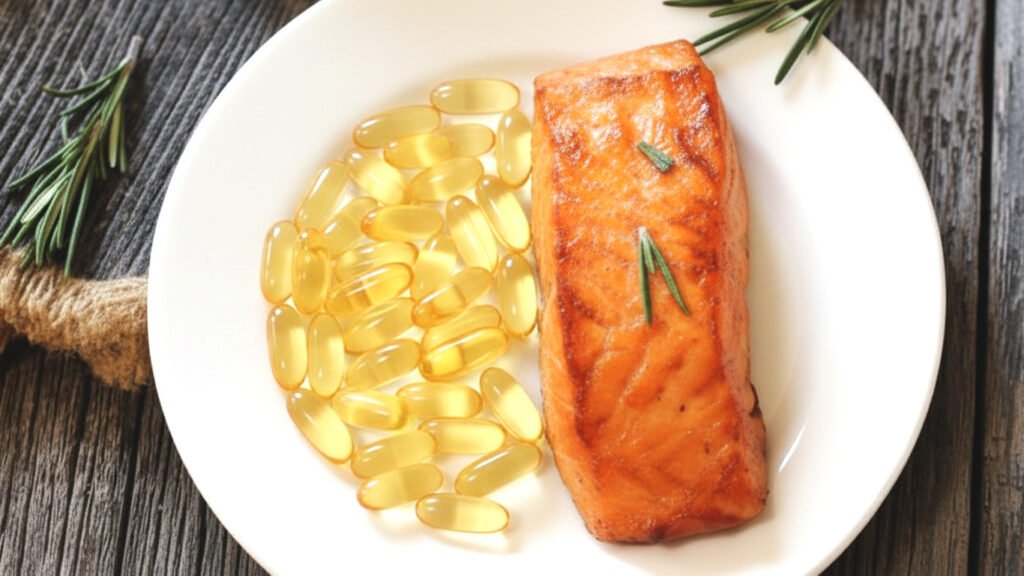By Entela, PhD Chemist specialized in natural products
This article is part of our supplement series. If you missed the first one, read it here, where we explore why supplements aren’t always the shortcut to health they promise to be.
Autumn, Supplements, and the Fish Oil Hype
With the arrival of autumn and cooler days, many people begin to think about how to strengthen their bodies for the months ahead. Shelves in pharmacies and supermarkets are full of promises, and one of the most popular choices is fish oil. Golden capsules that claim to support heart health, sharpen the brain, and keep inflammation under control have become part of the daily routine for millions.
But are these pills truly as powerful as advertised, or have they become another case where marketing outpaces science?
What Makes Fish Oil So Popular?
The appeal lies in omega-3 fatty acids, which the body cannot produce on its own. These fats are considered essential because they support brain development, eye health, and the regulation of inflammation. In food, we find them in three forms: EPA and DHA, which are mainly present in fatty fish, and ALA, which is abundant in plants like flaxseeds, chia seeds, walnuts, and pumpkin seeds. The human body can convert a small portion of ALA into EPA and DHA, but the process is not very efficient, which is why fish and seafood are often recommended as the best sources.
What the Research Shows
Decades of observational studies have suggested that populations who eat fatty fish regularly tend to have lower rates of cardiovascular disease. This led many to assume that taking fish oil supplements would offer the same benefits. Yet large clinical trials have not consistently supported this assumption.
Two important studies published in the New England Journal of Medicine in 2013 and 2018 found no significant reduction in heart attacks, strokes, or deaths among participants who took fish oil supplements, at least in people without major risk factors. Some benefits appeared only in subgroups who never ate fish at all. The evidence linking fish oil to lower cancer risk is also inconsistent, and results on mood, mental health, or inflammatory diseases remain uncertain.
Adding to the complexity, not all supplements are created equal. A recent study in JAMA Cardiology revealed that fish oil products vary widely in the amount of EPA and DHA they actually contain, and many are oxidized during processing. Oxidation not only diminishes effectiveness but can even provoke inflammation, the very problem people hope fish oil will solve.
Safety and Side Effects
Generally, fish oil is considered safe when taken in recommended doses. Still, many people experience unpleasant effects such as a fishy aftertaste, bad breath, or mild digestive issues like nausea and diarrhea. Skin rashes can also occur in sensitive individuals. More concerning is the fact that high doses may increase the risk of bleeding and, possibly, stroke.
There is also the question of purity. Large predatory fish, like tuna and swordfish, accumulate heavy metals and pollutants in their tissues. Supplements made from smaller, oily fish such as sardines, anchovies, mackerel, or herring tend to be safer choices because these species are lower on the food chain and contain fewer contaminants.

The Best Natural Sources of Omega-3s
If you prefer to rely on food rather than capsules, the best strategy is to include two servings of oily fish per week. Salmon is the most famous option, but the smaller varieties, sardines, anchovies, herring, and Atlantic or Spanish mackerel offer just as much omega-3, often at a lower cost and with fewer environmental and toxicological concerns.
For those who avoid fish, plants provide an alternative. Flaxseeds, chia seeds, walnuts, pumpkin seeds, and oils such as canola or soy deliver alpha-linolenic acid, which the body can partially convert into the longer-chain omega-3s. While conversion is limited, eating these foods regularly can help cover basic needs and protect against deficiency.
Food First, Supplements Second
How food, and its component molecules, affect the body is still largely a mystery. This is why the use of supplements for anything other than treating a deficiency remains questionable. Capsules cannot replace the complex orchestra of nutrients found in real food, where vitamins, minerals, and bioactive compounds work together in ways science is only beginning to understand.
What If You Already Take Fish Oil?
The answer depends on why you’re taking it. If your doctor has prescribed fish oil for high triglyceride levels, follow their advice, as this is a recognized medical use. If, however, you are taking it simply because it seems “good for you,” it may be time to reconsider. For most healthy people, the benefits are unproven.
If you don’t eat fish or seafood at all, a supplement might still help you avoid deficiency but you can also turn to ground flaxseed, chia seeds, walnuts and olive oil. One to two servings per day is usually enough to provide the omega-3s your body needs.
Takeaway
As the season shifts and health becomes a priority, it is tempting to believe that a capsule can replace a balanced diet. But fish oil supplements are not magic. For most people, the wiser path is to focus on whole foods, especially smaller oily fish and plant-based omega-3 sources, and to keep supplements as a backup plan rather than the foundation of health.
This article is part of the Kungul Supplement Series”
This article continues the conversation we began in our last blog on supplements, where I wrote:
“The safest path? Eat real food, sleep well, move your body, and use supplements only when you truly need them.”
Fish oil is just the beginning. In the coming weeks, I’ll explore other supplement categories and what the science really says about them. Stay tuned.

